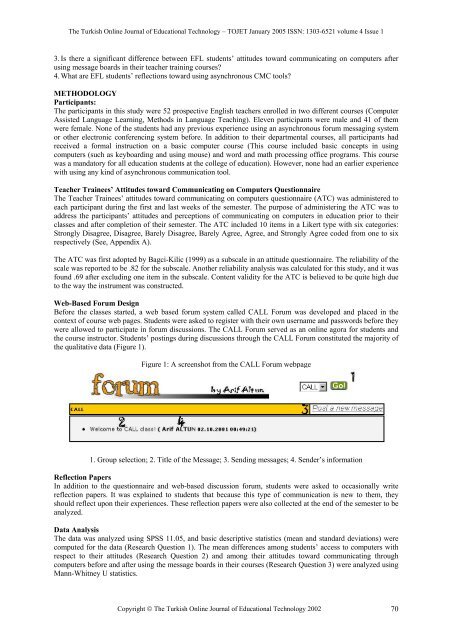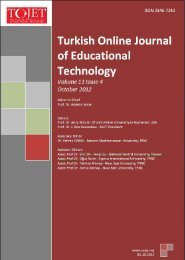Age - TOJET the Turkish online journal of educational technology
Age - TOJET the Turkish online journal of educational technology
Age - TOJET the Turkish online journal of educational technology
You also want an ePaper? Increase the reach of your titles
YUMPU automatically turns print PDFs into web optimized ePapers that Google loves.
The <strong>Turkish</strong> Online Journal <strong>of</strong> Educational Technology – <strong>TOJET</strong> January 2005 ISSN: 1303-6521 volume 4 Issue 1<br />
3. Is <strong>the</strong>re a significant difference between EFL students’ attitudes toward communicating on computers after<br />
using message boards in <strong>the</strong>ir teacher training courses?<br />
4. What are EFL students’ reflections toward using asynchronous CMC tools?<br />
METHODOLOGY<br />
Participants:<br />
The participants in this study were 52 prospective English teachers enrolled in two different courses (Computer<br />
Assisted Language Learning, Methods in Language Teaching). Eleven participants were male and 41 <strong>of</strong> <strong>the</strong>m<br />
were female. None <strong>of</strong> <strong>the</strong> students had any previous experience using an asynchronous forum messaging system<br />
or o<strong>the</strong>r electronic conferencing system before. In addition to <strong>the</strong>ir departmental courses, all participants had<br />
received a formal instruction on a basic computer course (This course included basic concepts in using<br />
computers (such as keyboarding and using mouse) and word and math processing <strong>of</strong>fice programs. This course<br />
was a mandatory for all education students at <strong>the</strong> college <strong>of</strong> education). However, none had an earlier experience<br />
with using any kind <strong>of</strong> asynchronous communication tool.<br />
Teacher Trainees’ Attitudes toward Communicating on Computers Questionnaire<br />
The Teacher Trainees’ attitudes toward communicating on computers questionnaire (ATC) was administered to<br />
each participant during <strong>the</strong> first and last weeks <strong>of</strong> <strong>the</strong> semester. The purpose <strong>of</strong> administering <strong>the</strong> ATC was to<br />
address <strong>the</strong> participants’ attitudes and perceptions <strong>of</strong> communicating on computers in education prior to <strong>the</strong>ir<br />
classes and after completion <strong>of</strong> <strong>the</strong>ir semester. The ATC included 10 items in a Likert type with six categories:<br />
Strongly Disagree, Disagree, Barely Disagree, Barely Agree, Agree, and Strongly Agree coded from one to six<br />
respectively (See, Appendix A).<br />
The ATC was first adopted by Bagci-Kilic (1999) as a subscale in an attitude questionnaire. The reliability <strong>of</strong> <strong>the</strong><br />
scale was reported to be .82 for <strong>the</strong> subscale. Ano<strong>the</strong>r reliability analysis was calculated for this study, and it was<br />
found .69 after excluding one item in <strong>the</strong> subscale. Content validity for <strong>the</strong> ATC is believed to be quite high due<br />
to <strong>the</strong> way <strong>the</strong> instrument was constructed.<br />
Web-Based Forum Design<br />
Before <strong>the</strong> classes started, a web based forum system called CALL Forum was developed and placed in <strong>the</strong><br />
context <strong>of</strong> course web pages. Students were asked to register with <strong>the</strong>ir own username and passwords before <strong>the</strong>y<br />
were allowed to participate in forum discussions. The CALL Forum served as an <strong>online</strong> agora for students and<br />
<strong>the</strong> course instructor. Students’ postings during discussions through <strong>the</strong> CALL Forum constituted <strong>the</strong> majority <strong>of</strong><br />
<strong>the</strong> qualitative data (Figure 1).<br />
Figure 1: A screenshot from <strong>the</strong> CALL Forum webpage<br />
1. Group selection; 2. Title <strong>of</strong> <strong>the</strong> Message; 3. Sending messages; 4. Sender’s information<br />
Reflection Papers<br />
In addition to <strong>the</strong> questionnaire and web-based discussion forum, students were asked to occasionally write<br />
reflection papers. It was explained to students that because this type <strong>of</strong> communication is new to <strong>the</strong>m, <strong>the</strong>y<br />
should reflect upon <strong>the</strong>ir experiences. These reflection papers were also collected at <strong>the</strong> end <strong>of</strong> <strong>the</strong> semester to be<br />
analyzed.<br />
Data Analysis<br />
The data was analyzed using SPSS 11.05, and basic descriptive statistics (mean and standard deviations) were<br />
computed for <strong>the</strong> data (Research Question 1). The mean differences among students’ access to computers with<br />
respect to <strong>the</strong>ir attitudes (Research Question 2) and among <strong>the</strong>ir attitudes toward communicating through<br />
computers before and after using <strong>the</strong> message boards in <strong>the</strong>ir courses (Research Question 3) were analyzed using<br />
Mann-Whitney U statistics.<br />
Copyright © The <strong>Turkish</strong> Online Journal <strong>of</strong> Educational Technology 2002 70
















